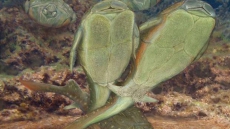As most of us struggle to juggle work commitments with the demands of family and daily life, new research suggests that slow pace of life is the secret to longevity - even if it amounts to curtailing sex life a bit.
The team of researchers from Tel Aviv University (TAU) in Israel reached this conclusion after studying the collected literature on 1,014 species of reptiles, including 672 lizards and 336 snakes.
They examined their life history parameters: body size, earliest age at first reproduction, body temperature, reproductive modes, litter or clutch size and frequency, geographic distribution and diet.
The researchers found that, among other factors, early sexual maturation and a higher frequency of laying eggs or giving birth were associated with shortened longevity.
The findings suggest that reduced reproductive rates and a plant-rich diet increase the lifespan of reptiles.
“Reproduction comes at the price of great stress to the mother. She experiences physiological stress, is unable to forage efficiently, and is more vulnerable to her surroundings. This reflects evolutionary logic. We found that reptiles that were sexually mature early on were less likely to make it to old age,” explained professor Shai Meiri from TAU's faculty of life sciences.
“Live fast and die young, they say - but live slow, live long is what we find,” Meiri added.
The team also discovered that herbivores - lizards with a plant-rich diet - lived longer than similar-sized carnivores that ate mostly insects.
Ingestion of a protein-rich diet led to fast growth, more intense reproduction and a shortened lifespan.
“Herbivorous reptiles were thought to consume nutritionally poorer food so they reached maturity later - and therefore lived longer,” added Inon Scharf from department of zoology at TAU.
The researchers also found that reptiles in geographically colder regions lived longer probably due to two factors: hibernation, which offers respite from predators and slower movement due to a seasonal drop in metabolic rate.
The paper was published in the journal Global Ecology and Biogeography.





